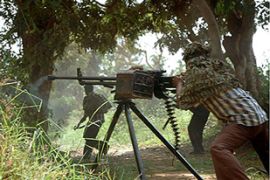Sri Lanka bombs Tamil Tiger bases
Sri Lankan capital hit by second explosion in two days as separatist stronghold falls.

Fall of Kilinochchi
There has been no comment from the Liberation Tigers of Tamil Eelam on the fall of Kilinochchi, considered the capital of the rebels fighting for a separate homeland for ethnic Tamils.
But Donald Gnanakone, founder of the Tamils for Justice, said that the loss, though symbolic, does not spell the end for the Tigers.
“They will never surrender,” the Los Angeles-based activist told Al Jazeera. “This struggle was not meant to have an end story of surrender, that will never ever happen. This is like asking the Palestinians to surrender the Gaza Strip and other areas to Israel.”
 |
| Government troops entered the Tamil Tiger’s de facto capital on Friday [AFP] |
Still, troops fighting their way into Kilinochchi on Friday was one of the biggest blows for the separatists in years.
Details of casualties from the fighting have not yet emerged and a pro-separatist website, Tamilnet.com, said the Tigers had moved their headquarters further northeast before the town fell.
“The Sri Lanka Army (SLA) has entered a virtual ghost town,” the website said. “The Tigers, who had put up heavy resistance so far, had kept their casualties as low as possible in the defensive fighting.”
Brigadier Udaya Nanyakkara, a Sri Lankan military spokesman, said troops were carrying out search and recovery operations in Kilinochchi town on Saturday.
Security, meanwhile, has been tightened across the island following a suicide bombing that killed three air force personnel in Colombo shortly after Mahinda Rajapaksa, the country’s president, announced the fall of the de facto rebel capital on Friday.
The LTTE started fighting the government in 1983. It says it is battling for the rights of minority Tamils in the face of mistreatment by successive governments led by the Sinhalese majority since Sri Lanka won independence from Britain in 1948.